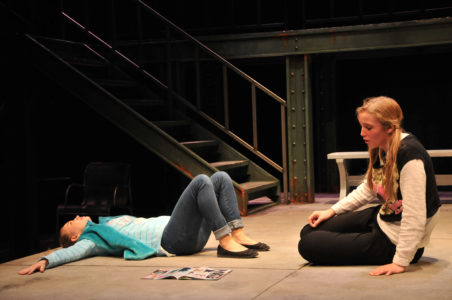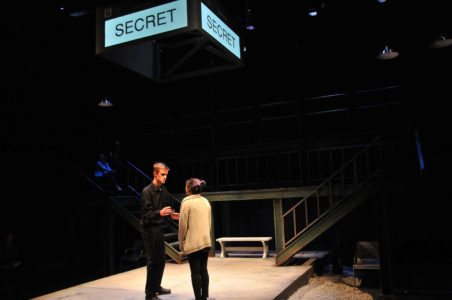

Caryl Churchill’s “Love and Information” has come to the College, and, as the director, Professor Lesley Delmenico, theater and dance, expressed, the play reaches “out to people for … intimacy, for connection, for understanding at a time we are not getting a whole lot of any of those.” Described as a true pioneer in contemporary theatre, Churchill works with non-realism. The production will run from Thursday Nov. 16 to Sunday Nov. 18, with Sunday being a matinee. Other showings are at 7:30 p.m.
Delmenico’s interpretation of “Love and Information” sets the play in a metropolitan train station that includes pieces of dialogue from various commuters. This performance relies on the lack of plot structure and disjointed connections to present the desire of intimacy in contemporary society. The fractionated bits of interaction between the various characters present at the train station serve to emphasize miscommunication and missed connections that plague daily life.
Delmenico asserts that political conditions made this particular production especially relevant, not only providing a much-needed laugh and escape from current tensions, but also to create a sense of connection and togetherness that modern technology potentially disrupts. Drawing upon recent controversy in the media, “Love and Information” inquires about the effects of having information constantly thrown at people. The question of credibility is also a major theme in the play, prompting the audience to contemplate the truth behind the information that people consistently receive.
Delmenico said that the lighting designer has contributed immensely to the portrayal of the connections and missed connections that define the play. The script itself has no line numbers, character assignments, or stage directions, just bare dialogue that provides fluidity in the direction it is taken.
In the original script, there are 57 scenes in seven sections. Delmenico condensed it, and the play will be roughly an hour and fifteen minutes long.
The cast contains many first-years, and Delmenico expressed that it was her goal to include them to bring new faces to Grinnell College theatre. She is quite impressed with the new talent she discovered.
“[The cast] just sort of jumped in with the first cold reading and … have been deepening their characters ever since,” said Delmenico. The versatility of the performers in her play are crucial, as their ability to play multiple characters are necessary for the production.
The coupling of abstract realism with bits of humorous absurdity will make this play not only enlightening, but a pleasure to witness.
“John McGrath really got it right when he wrote that theatre needs to provide a good night out for people,” Delmenico said. “What Churchill is doing with this play is providing a good night out.”





















































